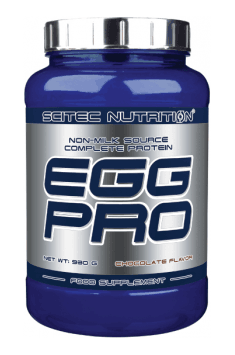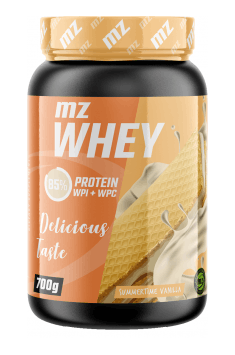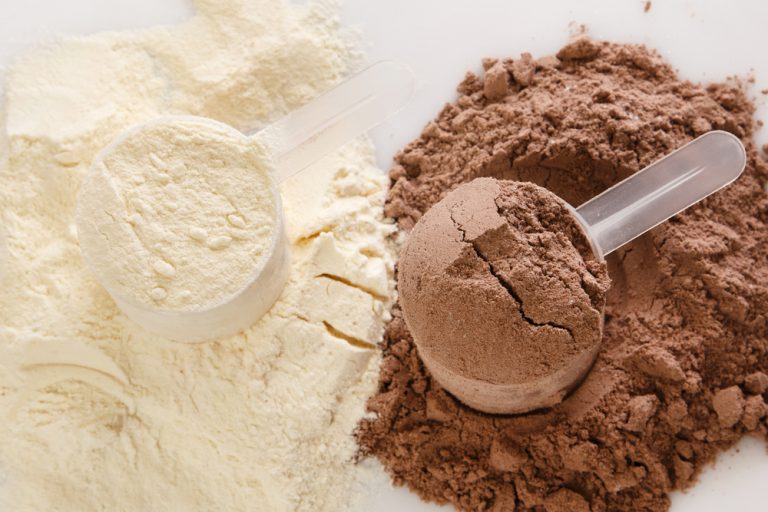When choosing the perfect protein supplement, many factors have to be taken into account. Most likely, we will spend some time experimenting with different types of nutrients and various brands of supplements before we find one that suits us best. In today's article, we compare the benefits of using egg white based nutrients and the most popular protein supplements, i.e. whey protein.
What is whey protein?
The most popular type of protein from which nutrients are produced is whey protein. Whey is formed as a by-product in the production of milk cheese. Due to the fact that the whey protein is obtained from milk, it may contain lactose.
What is egg protein?

Egg protein, as the name suggests, is obtained from eggs. After separating yolks and protein dehydration, a protein powder is formed.
Egg protein and whey protein - basic differences
Both egg protein and whey protein supplements are full value proteins. This means that they contain all the exogenous amino acids, i.e. those that our body is unable to produce alone and we must provide them from the outside. Exogenous amino acids are necessary for the construction and repair of all tissues. Egg protein and whey protein based nutrients provide a similar amount of protein. In the portion of egg-based nutrients you will find about 22-25 g of protein, in the portion of whey protein-based nutrients you will find from 20 to 30 g of protein.
The total caloric content of the two proteins is also comparable. A portion of protein produced from the egg proteins themselves provides about 100kcal, a portion of whey protein supplement depending on the producer and flavour provides from 110 to 130 kcal. The amount of fats and carbohydrates may vary depending on the product and brand. In the case of proteins obtained from whole eggs (along with yolks), the supplement will also contain more cholesterol.
Cons of whey proteins and egg proteins
Whey nutrients are obtained from milk. Therefore, they contain lactose. If you belong to people who do not tolerate lactose it will be better if you choose egg protein or whey protein isolate, which contains a small amount of lactose. Egg protein is one of the most common food allergens. Egg protein supplements are a source of albumin that can cause food allergies or intolerances. Apart from the mentioned albumin (ovalbumin), there are three other allergens in egg protein: ovomucoid, ovotransferine, and lysozyme.
The disadvantage of egg-based nutrients is also their price. Much higher than the price of whey proteins, including the high-end ones.
Advantages of whey protein
However, if you do not suffer from lactose intolerance, there is no reason to give up whey protein. Especially as research shows that including them in the diet may also bring health benefits. Whey proteins are an excellent source of milk biopeptides. Their role is the subject of research in the field of cancer prevention
Consumption of whey proteins has a positive effect on insulin levels and on a parameter called insulin sensitivity. Due to the high content of cysteine, whey proteins can influence the intracellular level of glutathione, thanks to which they increase resistance. Inclusion of whey proteins into the diet may favourably affect the lipid profile of the blood.

Building muscle mass
Studies have been carried out in which 20 men have been subjected to a 10-week exercise program. One group received 15 grams of casein and whey protein with 5 grams of BCAA while the rest received 20 grams of placebo. Those who took whey protein experienced a greater increase in muscle strength and lean muscle mass. Appropriate supply of nutritious proteins ensures the synthesis of muscle proteins. Thanks to this, muscle fibres regenerate faster after training. They build up to become stronger and bigger.
Whey protein has the advantage over an egg protein that contains more branched chain amino acids that are necessary for the synthesis of muscle proteins and the development of muscle tissue. Unfortunately, egg protein has not been studied as much as whey protein in the last decade, so there are no scientific studies that comprehensively compare these two types of protein.
Appetite control
One recent study published in the Nutrition Journal found that whey protein was more effective in suppressing appetite than egg protein.
Which protein is better?
It’s impossible to answer this question unequivocally. Everything will depend on who takes it, when and why. It’s worth remembering that egg protein takes longer to absorb. It will be better for the night - e.g. served with casein. In turn, WPC or WPI is ideally suited as a post-workout protein (fast-absorbing) and temporarily during the day to supplement the protein diet.
To sum up
Protein is the most often discussed macroelement in sports nutrition. No wonder that there are so many different types of protein supplements available. Even if whey protein seems to offer more benefits than egg protein, the latter is also a source of high quality essential amino acids that the body needs. Do not be afraid to try different solutions and see what works better for you.






